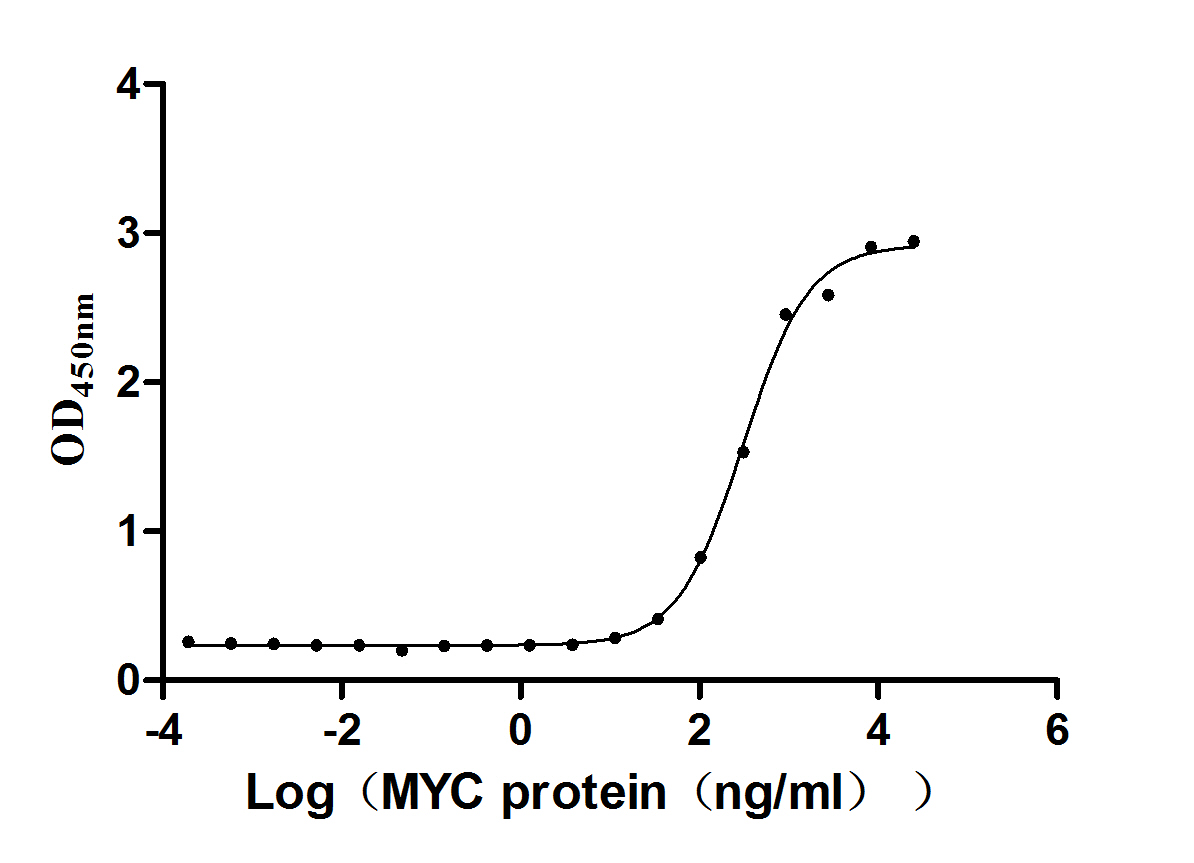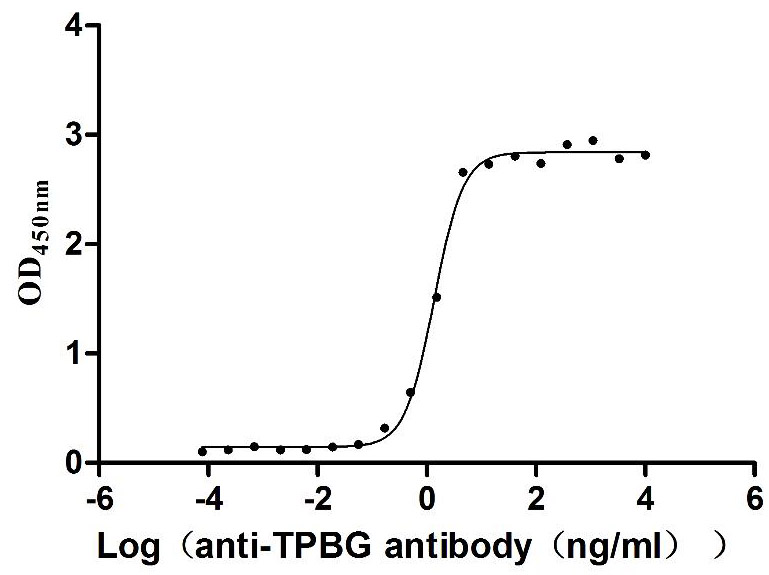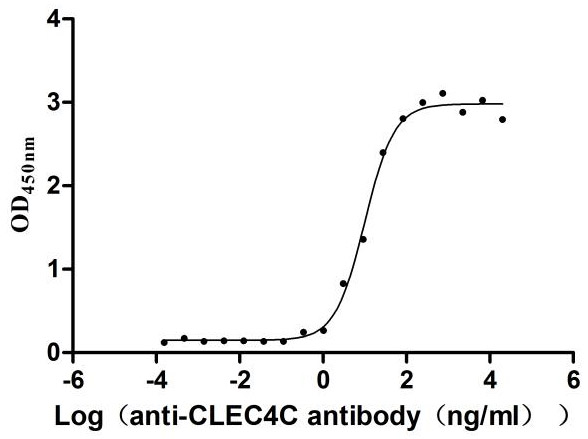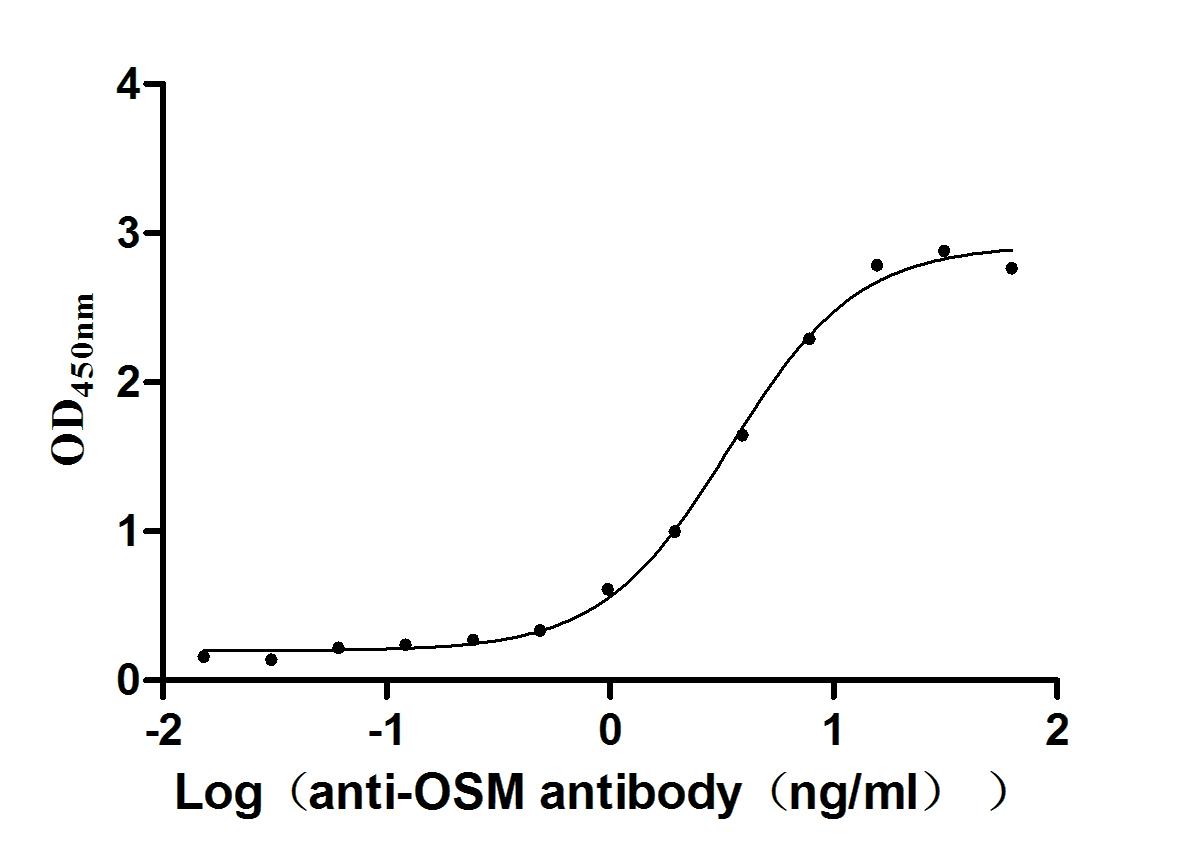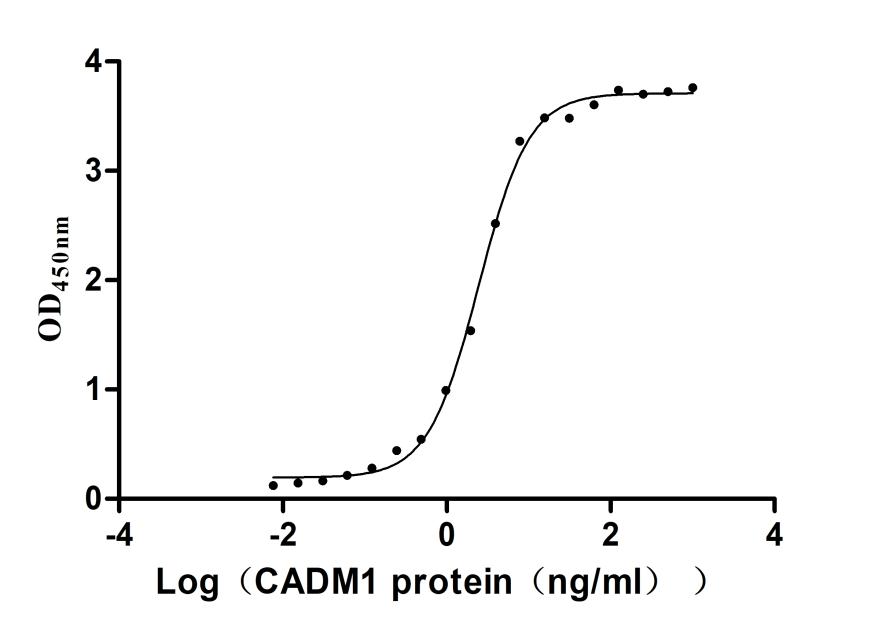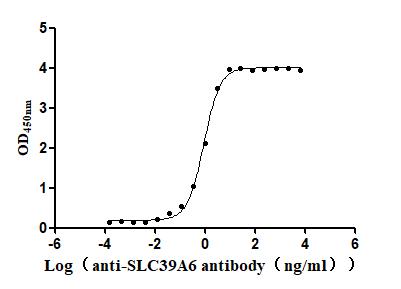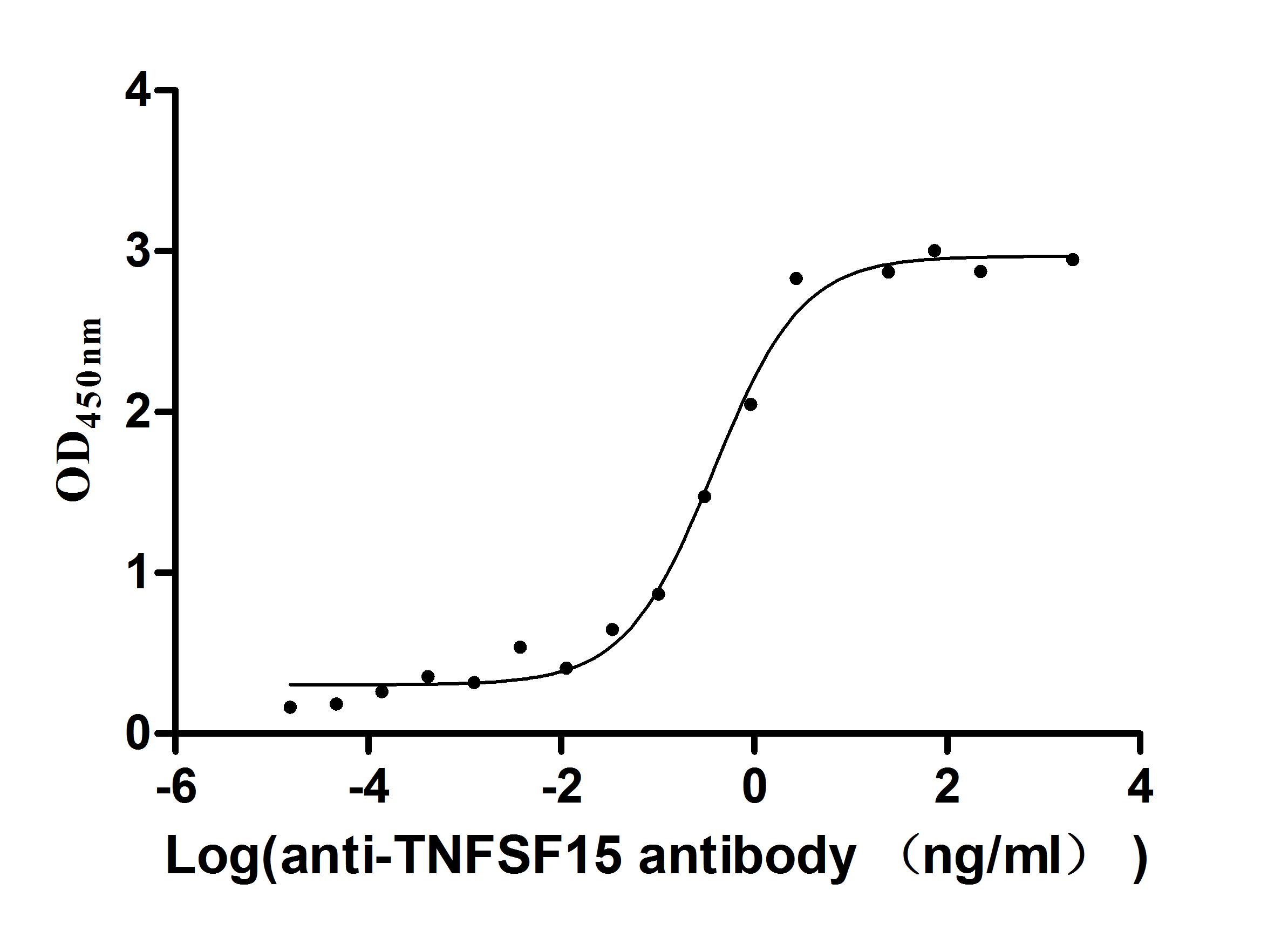Recombinant Mouse Protein arginine N-methyltransferase 5 (Prmt5)
-
货号:CSB-YP807540MO
-
规格:
-
来源:Yeast
-
其他:
-
货号:CSB-EP807540MO
-
规格:
-
来源:E.coli
-
其他:
-
货号:CSB-EP807540MO-B
-
规格:
-
来源:E.coli
-
共轭:Avi-tag Biotinylated
E. coli biotin ligase (BirA) is highly specific in covalently attaching biotin to the 15 amino acid AviTag peptide. This recombinant protein was biotinylated in vivo by AviTag-BirA technology, which method is BriA catalyzes amide linkage between the biotin and the specific lysine of the AviTag.
-
其他:
-
货号:CSB-BP807540MO
-
规格:
-
来源:Baculovirus
-
其他:
-
货号:CSB-MP807540MO
-
规格:
-
来源:Mammalian cell
-
其他:
产品详情
-
纯度:>85% (SDS-PAGE)
-
基因名:Prmt5
-
Uniprot No.:
-
别名:Prmt5; Jbp1; Skb1Protein arginine N-methyltransferase 5; Prmt5; EC 2.1.1.320; Histone-arginine N-methyltransferase PRMT5; Jak-binding protein 1; Shk1 kinase-binding protein 1 homolog; SKB1 homolog
-
种属:Mus musculus (Mouse)
-
蛋白长度:Full Length of Mature Protein
-
表达区域:2-637
-
氨基酸序列AAMAVGGAG GSRVSSGRDL NCVPEIADTL GAVAKQGFDF LCMPVFHPRF KREFIQEPAK NRPGPQTRSD LLLSGRDWNT LIVGKLSPWI HPDSKVEKIR RNSEAAMLQE LNFGAYLGLP AFLLPLNQED NTNLARVLTN HIHTGHHSSM FWMRVPLVAP EDLRDDVIAN APTTHTEEYS GEEKTWMWWH NFRTLCDYSK RIAVALEIGA DLPSNHVIDR WLGEPIKAAI LPTSIFLTNK KGFPVLSKVQ QRLIFRLLKL EVQFIITGTN HHSEKEFCSY LQYLEYLSQN RPPPNAYELF AKGYEDYLQS PLQPLMDNLE SQTYEVFEKD PIKYSQYQQA IYKCLLDRVP EEEKETNVQV LMVLGAGRGP LVNASLRAAK QAERRIRLYA VEKNPNAVVT LENWQFEEWG SQVTVVSSDM REWVAPEKAD IIVSELLGSF ADNELSPECL DGAQHFLKDD GVSIPGEYTS FLAPISSSKL YNEVRACREK DRDPEAQFEM PYVVRLHNFH QLSAPKPCFT FSHPNRDPMI DNNRYCTLEF PVEVNTVLHG FAGYFETVLY RDITLSIRPE THSPGMFSWF PIFFPIKQPI TVHEGQNICV RFWRCSNSKK VWYEWAVTAP VCSSIHNPTG RSYTIGL
-
蛋白标签:Tag type will be determined during the manufacturing process.
The tag type will be determined during production process. If you have specified tag type, please tell us and we will develop the specified tag preferentially. -
产品提供形式:Lyophilized powder
Note: We will preferentially ship the format that we have in stock, however, if you have any special requirement for the format, please remark your requirement when placing the order, we will prepare according to your demand. -
复溶:We recommend that this vial be briefly centrifuged prior to opening to bring the contents to the bottom. Please reconstitute protein in deionized sterile water to a concentration of 0.1-1.0 mg/mL.We recommend to add 5-50% of glycerol (final concentration) and aliquot for long-term storage at -20℃/-80℃. Our default final concentration of glycerol is 50%. Customers could use it as reference.
-
储存条件:Store at -20°C/-80°C upon receipt, aliquoting is necessary for mutiple use. Avoid repeated freeze-thaw cycles.
-
保质期:The shelf life is related to many factors, storage state, buffer ingredients, storage temperature and the stability of the protein itself.
Generally, the shelf life of liquid form is 6 months at -20°C/-80°C. The shelf life of lyophilized form is 12 months at -20°C/-80°C. -
货期:Delivery time may differ from different purchasing way or location, please kindly consult your local distributors for specific delivery time.Note: All of our proteins are default shipped with normal blue ice packs, if you request to ship with dry ice, please communicate with us in advance and extra fees will be charged.
-
注意事项:Repeated freezing and thawing is not recommended. Store working aliquots at 4°C for up to one week.
-
Datasheet :Please contact us to get it.
靶点详情
-
功能:Arginine methyltransferase that can both catalyze the formation of omega-N monomethylarginine (MMA) and symmetrical dimethylarginine (sDMA), with a preference for the formation of MMA. Specifically mediates the symmetrical dimethylation of arginine residues in the small nuclear ribonucleoproteins Sm D1 (SNRPD1) and Sm D3 (SNRPD3); such methylation being required for the assembly and biogenesis of snRNP core particles. Methylates SUPT5H and may regulate its transcriptional elongation properties. Mono- and dimethylates arginine residues of myelin basic protein (MBP) in vitro. May play a role in cytokine-activated transduction pathways. Negatively regulates cyclin E1 promoter activity and cellular proliferation. Methylates histone H2A and H4 'Arg-3' during germ cell development. Methylates histone H3 'Arg-8', which may repress transcription. Methylates the Piwi proteins (PIWIL1, PIWIL2 and PIWIL4), methylation of Piwi proteins being required for the interaction with Tudor domain-containing proteins and subsequent localization to the meiotic nuage. Methylates RPS10. Attenuates EGF signaling through the MAPK1/MAPK3 pathway acting at 2 levels. First, monomethylates EGFR; this enhances EGFR 'Tyr-1197' phosphorylation and PTPN6 recruitment, eventually leading to reduced SOS1 phosphorylation. Second, methylates RAF1 and probably BRAF, hence destabilizing these 2 signaling proteins and reducing their catalytic activity. Required for induction of E-selectin and VCAM-1, on the endothelial cells surface at sites of inflammation. Methylates HOXA9. Methylates and regulates SRGAP2 which is involved in cell migration and differentiation. Acts as a transcriptional corepressor in CRY1-mediated repression of the core circadian component PER1 by regulating the H4R3 dimethylation at the PER1 promoter. Methylates GM130/GOLGA2, regulating Golgi ribbon formation. Methylates H4R3 in genes involved in glioblastomagenesis in a CHTOP- and/or TET1-dependent manner. Symmetrically methylates POLR2A, a modification that allows the recruitment to POLR2A of proteins including SMN1/SMN2 and SETX. This is required for resolving RNA-DNA hybrids created by RNA polymerase II, that form R-loop in transcription terminal regions, an important step in proper transcription termination. Along with LYAR, binds the promoter of gamma-globin HBG1/HBG2 and represses its expression. Symmetrically methylates NCL. Methylates TP53; methylation might possibly affect TP53 target gene specificity. Involved in spliceosome maturation and mRNA splicing in prophase I spermatocytes through the catalysis of the symmetrical arginine dimethylation of SNRPB (small nuclear ribonucleoprotein-associated protein) and the interaction with tudor domain-containing protein TDRD6.
-
基因功能参考文献:
- PRMT activity is selectively augmented during the initial activation of exercise-induced skeletal muscle remodeling in vivo. PMID: 29112628
- OGG1 affects PRMT5 binding on histone H4 and the formation of dimethylation of histone H4 arginine-3 via PRMT5. PMID: 29409673
- observed the progressive decrease in PRMT5 during oligodendrocyte differentiation PMID: 30057274
- the present study increases our understanding of PRMT1, -4, and -5 biology during the plasticity of skeletal muscle development. Our results provide evidence for a role of PRMT1, via a mitochondrially mediated mechanism, in driving the muscle differentiation program. PMID: 29208765
- the nuclear localized CA-VI B selectively promotes IL-12 expression by interaction with protein arginine N-methyltransferase 5 (PRMT5), which reduces symmetric dimethylation of histone H3 arginine 8 modification (H3R8me2s) at Il12 promoters to facilitate chromatin accessibility, selectively enhancing c-Rel binding to the Il12b promoter. PMID: 28739930
- PRMT5 is an osteoclastogenesis activator and PRMT5 inhibition suppresses osteoclast differentiation via downregulation of CXCL10 and RSAD2. PMID: 28302565
- PRMT1 inhibition prevents gastric cancer progression by downregulating eIF4E and targeting type II PRMT5. PMID: 28987382
- PRMT5 regulates internal ribosome entry site-dependent translation via methylation of hnRNP A1. PMID: 28115626
- PRMT5 maintains progenitor cells through its regulation of Bmp4; adult and embryonic stem cells also require PRMT5 for maintaining pluripotency, suggesting that similar mechanisms might regulate lineage-restricted progenitor cells during organogenesis. PMID: 27827819
- Menin and PRMT5 suppress GLP1R transcript levels and PKA-mediated phosphorylation of FOXO1 and CREB. PMID: 28270438
- findings show that PRMT5 is an important modulator of CD4(+) T cell expansion; PRMT5 was transiently upregulated during maximal proliferation of mouse and human memory Th cells; data implicate PRMT5 in the regulation of adaptive memory Th cell responses PMID: 28087667
- Prmt5 facilitates promoter-enhancer looping and gene expression at the PPARgamma2 locus, which encodes a critical lineage-determining factor that drives the differentiation of adipose tissue. PMID: 26935580
- Taken together, our data reveal a pathophysiologically relevant role for PRMT5 in MHC II transactivation in macrophages PMID: 26972221
- Prmt5 is required for germ cell survival during spermatogenesis in mice. PMID: 26072710
- Prmt5 controls proliferation of adult muscle stem cells by direct epigenetic silencing of the cell cycle inhibitor p21. PMID: 26028225
- Prmt5 plays critical roles in germ cell development that are required for germ cell survival during embryonic stages PMID: 25810472
- results demonstrate that PRMT5 plays distinct roles in the behavior of HSCs compared with HPCs and is essential for the maintenance of adult hematopoietic cells. PMID: 26258414
- PRMT5 regulates gene expression by promoting methylation of the Sm spliceosomal proteins, but is not required for primordial germ cell specification. PMID: 25519955
- PRMT5 controls symmetrical dimethylation on arginine-3 of histone H4 in mouse embryonic fibroblasts. PMID: 24097435
- PRMT5 knockdown in non-Hodgkin lymphoma cell lines and primary lymphoma cells leads to RBL2 derepression and RB1 reactivation, which in turn inhibit PRC2 expression. PMID: 24189068
- PRMT5 is a master regulator of splicing in mammals PMID: 24013503
- type II protein arginine methyltransferase 5 has a role in the regulation of Circadian Per1 and CRY1 genes PMID: 23133559
- SC1 and PRMT5 are components of an epigenetic regulatory complex that maintains the "stem-like" cellular state of the neural stem cells. PMID: 23048031
- Prmt5 acts as a coactivator for the activation of adipogenic gene expression and promotes adipogenic differentiation. PMID: 22361822
- CpG-rich islands within the Id2 and Id4 genes were bound by PRMT5 and were hypomethylated in PRMT5-deficient cells, suggesting that PRMT5 plays a role in gene silencing during glial cell PMID: 22041901
- Prmt5 exhibited remarkable reprogramming of mouse embryonic fibroblasts into which Prmt5, Klf4, and Oct3/4 were introduced. PMID: 21270127
- Increased PRMT5 activity mediates key events associated with cyclin D1-dependent neoplastic growth, including CUL4 repression, CDT1 overexpression, and DNA rereplication. PMID: 20951943
- Blimp1-Prmt5 translocates from the nucleus to the cytoplasm, resulting in the loss of H2A/H4 R3 methylation at the time of extensive epigenetic reprogramming of germ cells. Then, Dhx38, a putative target of the Blimp1-Prmt5 complex, is upregulated. PMID: 16699504
- The requirement for Prmt5 and the class I arginine methyltransferase Carm1/Prmt4 in the temporal control of myogenesis, was investigated. PMID: 19188441
显示更多
收起更多
-
亚细胞定位:Cytoplasm. Nucleus. Golgi apparatus.
-
蛋白家族:Class I-like SAM-binding methyltransferase superfamily, Protein arginine N-methyltransferase family
-
数据库链接:
KEGG: mmu:27374
STRING: 10090.ENSMUSP00000023873
UniGene: Mm.196585
Most popular with customers
-
Recombinant Human papillomavirus type 16 Protein E7 (E7) (Active)
Express system: E.coli
Species: Human papillomavirus type 16
-
Recombinant Human Trophoblast glycoprotein (TPBG), partial (Active)
Express system: Mammalian cell
Species: Homo sapiens (Human)
-
Recombinant Human C-type lectin domain family 4 member C (CLEC4C), partial (Active)
Express system: Mammalian cell
Species: Homo sapiens (Human)
-
Recombinant Human Oncostatin-M (OSM), partial (Active)
Express system: Mammalian cell
Species: Homo sapiens (Human)
-
Recombinant Human Cytotoxic and regulatory T-cell molecule (CRTAM), partial (Active)
Express system: Mammalian cell
Species: Homo sapiens (Human)
-
Recombinant Macaca fascicularis Zinc transporter ZIP6 isoform X1(SLC39A6),partial (Active)
Express system: Baculovirus
Species: Macaca fascicularis (Crab-eating macaque) (Cynomolgus monkey)
-
Express system: Mammalian cell
Species: Homo sapiens (Human)


